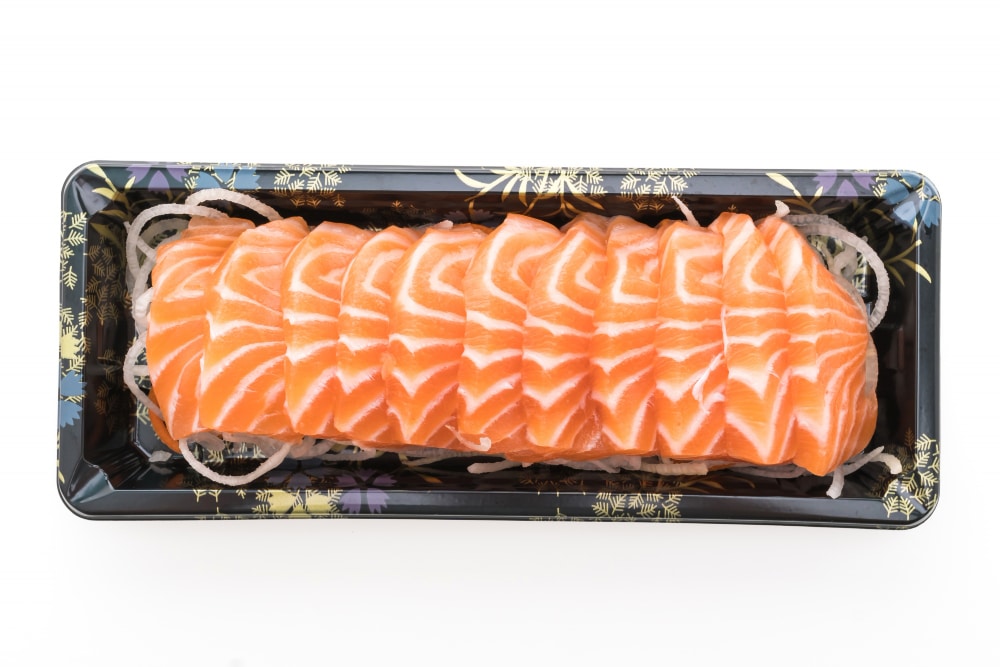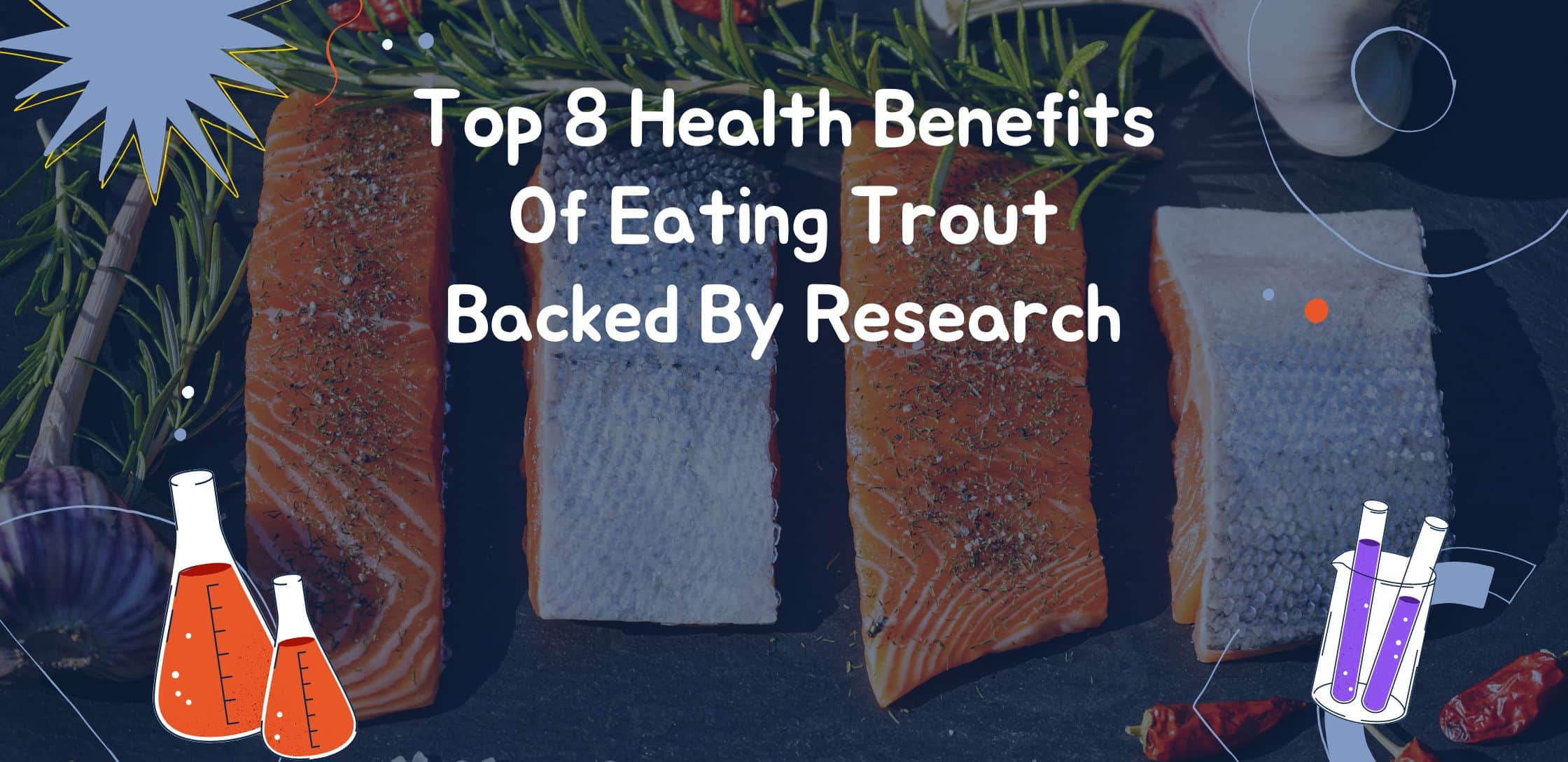Top 8 Health Benefits Of Eating Trout Backed By Research
Important Note: When you buy through our links, we may earn a commission. As an Amazon Associate we earn from qualifying purchases. Content, pricing, offers and availability are subject to change at any time - more info.
Trout is a freshwater fish belonging to the salmon family. Found in fresh bodies of water throughout North America, Europe, and Asia, trout is a white fish that’s known by the scientific community as Oncorhynchus mykiss. When prepared well, trout is light, flaky, tender, and mild in flavor. Notably, trout lends itself well to the following preparations: frying, broiling, grilling, and baking.
Of note, there are a few common varieties of trout, namely rainbow, brown, and brook varieties. Although there are some variations in the nutrients distinguishing the three varieties, for this analysis, the listed benefits apply to all three. An excellent source of protein, vitamins, and minerals, trout has many suggested health benefits. In fact, by many scientific communities, trout is considered a superfood. Here’s why.
Important Note: The claims concerning the benefits of eating trout reviewed herein are backed by extensive research. Trout has been studied as a superfood for decades therefore the claims listed herein are trustworthy. At the time of this publication, the information herein was supported by extensive, current research.
Packed With Protein

The protein/calorie ratio of trout is excellent for maintaining a healthy diet. Significantly, a single portion of trout is packed with 22 grams of protein and only 130 calories. A much healthier option in comparison to other protein-packed meats and fish, trout is a worthy addition to your diet. Protein aids in the development of muscles as well as repairing damaged tissue. Moreover, a high-protein diet aids in maintaining weight, burning fat, and supporting energy levels as well as improving nail and hair growth. What’s more, the daily recommended protein intake for adults is between 50 and 70 grams and only one serving of trout can help you meet half your day’s goal.
General Consensus: 5/5 and here is why. Mindful preparation of trout dishes can easily maintain the high protein/low-calorie ratio. Decades of research support the claim that high-protein choices can improve one’s overall health. As such, trout is an excellent high-protein addition to one’s diet.
Loaded With Niacin
Niacin plays an integral role in the body’s overall health; many of niacin’s functions mirror the benefits of an adequate protein intake. Notably, niacin contributes to hundreds of biochemical functions in the human body. Most significantly, niacin is important for giving you energy. Niacin is not stored in the body, therefore, needs to be obtained regularly through the food you eat. Meat products are one of the main sources of ingested niacin. Besides giving the body energy, other benefits of adequate niacin intake include repairing DNA strands, acting as an antioxidant, healthy skin, digestive regularity, and maintaining a healthy nervous system. It’s recommended that adults get approximately 15 milligrams of niacin per day. A single serving of trout contains about 5 milligrams of trout, making this tasty fish a great contributor to the body’s required amount of niacin per day.
General Consensus: 4.5/5 and here is why. Although trout in and of itself will not give you your daily dose of niacin, it’s a laudable contributor. As a result, mindfully incorporating trout into your diet can help you to meet your body’s niacin needs.
Supports Brain Health
Remarkably, trout is chock-full of omega-3 fatty acids. Although these acids are associated with attributes connected to many bodily functions, brain function and health are their most notable benefits. Scientific research has long indicated the connection between omega-3 fatty acids and brain health. Inarguably, omega-3 fatty acids are linked to early cognitive development, supporting memory in adulthood, and the reduction of age-related mental decline. Notably, a single serving of trout contains a whopping 581milligrams of omega-3 fatty acids. Hundreds of studies connect the omega-3 fatty acid content in trout to the support of brain health which is one of the many reasons this fish is dubbed a superfood.
General Consensus: 5/5 and here is why. Tons of scientific research connects omega-3 fatty acids to brain health. Trout, as a carrier of high levels of omega-3 fatty acids, can undoubtedly aid in the consumption of recommended amounts of these incredible acids.
Reduces Inflammation

As important to the link between omega-3 fatty acids and brain health is the link between omega-3 fatty acids and their anti-inflammatory properties. Bodily inflammation can contribute to heart disease, diabetes, and kidney disease among other disorders. Studies show that adequate consumption of omega-3 fatty acids reduces inflammation may resolve some of the aforementioned risks. Choosing a diet that incorporates oily fishes, such as trout, that are high in anti-inflammatory acids and nutrients can reduce one’s risk of chronic illness and disease.
General Consensus: 5/5 and here is why. The research doesn’t lie. There’s no doubt that oily fish and omega-3 fatty acids are connected to anti-inflammation. There’s also no question that trout is one of the handful or so of fish capable of contributing to anti-inflammation.
Lowers Risk of Chronic Diseases
Besides the litany of chronic illnesses addressed by omega-3 fatty acids, trout is also fraught with other disease-fighting nutrients. Another top nutrient found in trout is vitamin D. Adequate vitamin D in one’s diet is linked to a reduced risk of cancer, diabetes, heart disease, and other illnesses. Overall, vitamin D is essential to supporting overall health and wellness. Although much of the human body’s need for vitamin D comes from sunlight, an important secondary source comes from diet. Studies have clearly shown that vitamin D has a great impact on staving off autoimmune diseases, chronic illnesses, and infectious diseases. According to the USDA, a single serving of trout contains 125% of your required daily intake of vitamin D. Clearly, the benefit of eating trout as a source of vitamin d is inevitable.
General Consensus: 4.5/5 and here is why. Without a doubt, vitamin D will not solely ward off disease. Nevertheless, it is a proven contributor to the reduced risk of many chronic illnesses and diseases. Trout is loaded with and shouldn’t be overlooked as a beneficial source of vitamin D.
Considered a Clean Fish

Trout is considered one of the cleanest fishes to eat. It contains only low levels of mercury and very few contaminants. Other fish, such as swordfish and tuna, for instance, are high in mercury and contaminants; when eaten en masse, such fish can have adverse effects on your health. Trout, however, has routinely tested low in levels of mercury, lead, insecticides, and cadmium among other contaminants. As a result, trout is considered one of the safest fishes for human consumption; it can be eaten regularly without cause for concern.
General Consensus: 5/5 and here is why. Study after study indicates that not only does trout have inherently low levels of mercury and contaminants when compared to other fishes, but in its own right it’s an incredibly safe fish to consume.
Low in Calories
There’s no doubt that a low-calorie diet aids in reducing bodily waste, instances of obesity, inflammation, glucose levels, and improving metabolism. Moreover, a low-calorie diet greatly reduces the risk of heart disease and diabetes. As such, trout, a low-calorie fish, is a great option for reducing your calories at meal time. In fact, trout has only one-third the amount of calories as alternative meat options. By substituting trout for other meats and fishes you can greatly decrease your calorie intake. Certainly, it’s important to be mindful about how you prepare your trout as particular preparations, frying for instance, may increase the calorie count.
General Consensus: 5/5 and here is why. Trout is intrinsically low in calories. So long as your trout preparation is also low in calories, this fish is a wonderful substitute for proteins that are higher in calorie count.
Loaded With Essential Vitamins
Like many oily, white fish varieties, trout is loaded with vitamins essential to the body’s daily functions. Trout is packed with calcium, iron, magnesium, phosphorus, potassium, sodium, zinc, niacin, and so many other necessary nutrients. Furthermore, trout is rich in vitamins A, B6, E, B12, and D. As a source of so many necessary nutrients, many of which can be purchased separately as supplements, trout provides the body with a rich and delicious source of macronutrients, minerals, and vitamins in one serving.
General Consensus: 5/5 and here is why. Trout is more nutrient dense than almost any other meat source. In one sitting, you can come close to consuming a hefty amount of your daily vitamin intake.
Unlikely Benefits: Further Research Required
Aids in the Prevention and Treatment of Depression
General Consensus: 2/5 and here is why. Although there are connections between eating omega-3 fatty acids and managing depression, it’s not clear whether there’s enough to do so in trout alone. Moreover, studies supporting the regular consumption of trout and preventing depression are lacking.
Prevents Onset of Asthma in Childhood
General Consensus: 2/5 and here is why. Despite there being a handful of studies mentioning a relationship between omega-3 fatty acids and incidents of asthma in children, there are too few studies supporting this claim.
Improves Sleep Quality
General Consensus: 2/5 and here is why. There are thousands of studies that support the claim that a health-conscious diet can improve one’s quality of sleep. There are even many connecting regular fish consumption to better sleep. However, there are only seven studies that make a direct link between trout and sleep quality. More evidence is needed.
























